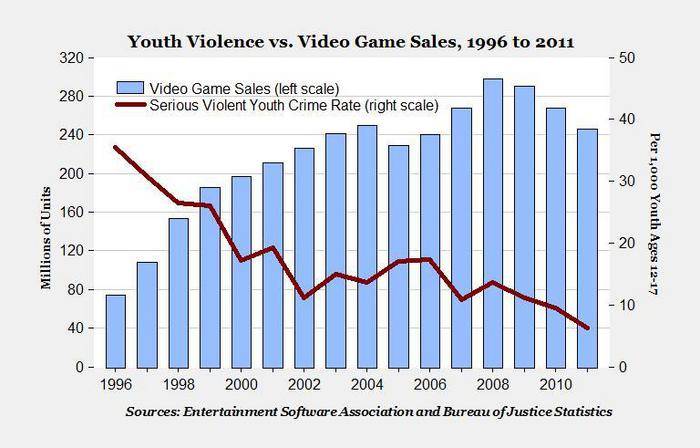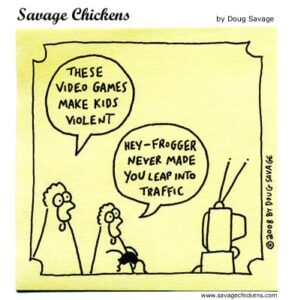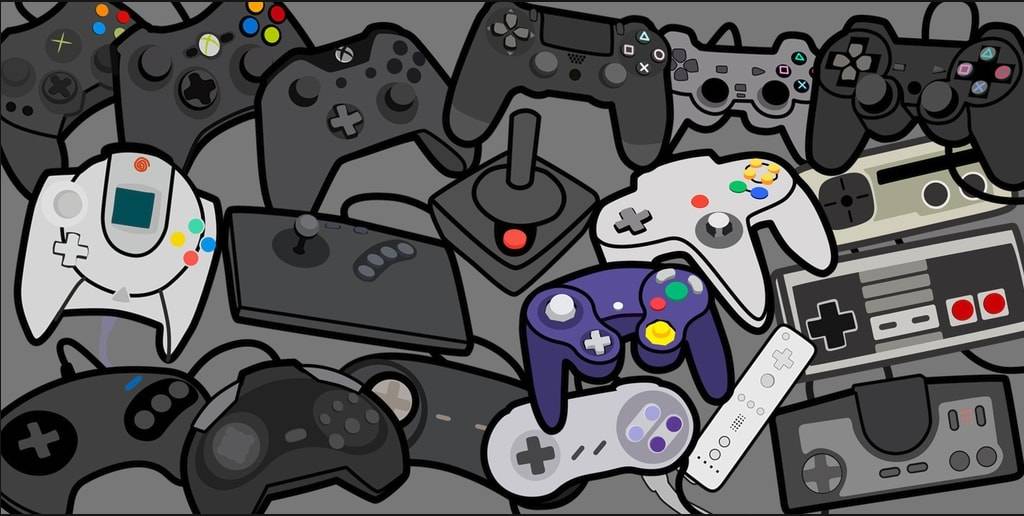Video Transcript
Cody: This is my man Ryan from “Nerds on Call.” Well, Ryan, this is a big topic right now. People are talking about video games again, the violence of video games, who should be playing, does it have an effect on you emotionally when you’re playing them, all that stuff.
Ryan: Yes. Well, the good news is they’re both helpful…maybe a little bit harmful. So, we’re gonna dig into some of the research. So, Donald Trump recently said, after the Florida shooting, that maybe video games and violent media is the cause and that it should be looked into. So, we invited video game industry leaders up to Washington on March 8th to chat with him about that. And so, we did a little research ourselves. I’ve done the internet a thing or two.
And so I looked it up and I said, “Well are they bad or are they good?” So, critics argue that they desensitize people towards violence. You know, kids as they’re playing video games, they get to do really violent things and maybe that makes them accept violent acts more often. They get rewarded for violent behavior in a video game but, I mean really, who doesn’t want to hit a mime with a bat, though? I mean, come on.
So, it also teaches children that solving problems or conflicts with violence sometimes is a good thing, right? I mean, that all sounds really bad. That’s what the critics are saying. So, the American Psychological Association in August of 2015 said that research demonstrates a link between violent video game use and both an increase in aggressive behavior and a decrease in prosocial behavior like empathy and moral engagement, right? That sounds really bad, too.
Cody: That does sound bad.
Ryan: And the American Academy of Pediatrics in July of 2016 said, “Video games that use human or other living targets or award points for killing teaches children to associate pleasure and success with their ability to cause pain and suffering to others.” This sounds really terrible.
Cody: Yeah, you’re not helping me at my house right now.
Ryan: But…
Cody: Here’s the…okay, okay. But.
Ryan: …there is no actual evidence that shows that violent video games is connected to societal…I’ll say that again, societal violence. In fact, video games from 1994 to 2014 have actually increased by 204%, video game purchases and hardware sales, while violent crime has decreased…
Cody: Decreased.
Ryan: …37%. And that murders by juveniles acting alone has fallen 76% in that exact same period of time. And violent crime, this is the Juvenile Violent Crime Index arrest rate has dropped 63% from 1994 to 2012. And it was reported that in 1991, you were 43% more likely to be in a violent conflict in high school than in 2013, which is only 25%.
So you see, violence is going down, video game use is going up. So, that doesn’t quite make a lot of sense, right?
Cody: It doesn’t correlate, okay.
Ryan: Do video games make someone more violent or do violent people just like video games? That’s a good question, right?
Cody: That’s a good question.
Ryan: So, this is Patrick Markey. He’s the psychology professor at Villanova University. He wrote this cool book called “Moral Combat.” And on this he talks about the fact that video games, immediately after use, it increases your, I don’t know, acceptance towards violence. And one of the examples he gave is people were more likely to give spicy hot sauce to people who don’t like spicy food. I mean, that’s kinda mean, right?
It also temporarily increases aggression, but it does the same thing as when you watch a movie. It’s the same kind of reaction you have. If you watch a sad movie like “Fault in Our Stars,” you’re gonna be sad, but it doesn’t make you clinically depressed, right? And so video games is the same way. It’s there’s a temporary reaction to this violence and your aggressions go up, but it’s temporary. It eventually goes away.
Cody: By the way, just showing that makes me wanna cry.
Ryan: So there was an economic study published in February of 2016 about violent video games and violent crime, and what it found is that societal violence decreases the weeks after a big video game release. That’s weird, right?
And so this gentleman here, this is Christopher Ferguson, the associate professor and co-chairman at the Department of Psychology at the Stevenson University. He says that basically by keeping young males busy with things that they like keeps them off the streets and out of trouble. So, maybe giving them video games makes them more, like, aggressive, but it makes them aggressive towards something that’s innate rather than regular people.
Cody: Fascinating.
Ryan: Isn’t that pretty cool?
Cody: Okay, we’re out of time, unfortunately. This is fascinating.
Ryan: There’s gonna be more on our blog. We wrote a big article about it. So if you’re really interested in this subject and you want to see some of the more statistics, just go to callnerds.com/blog.
Cody: Really interesting. Thanks for working that down.
Ryan: Yeah, you’re welcome.
Cody: He’s gonna be back. You’ve got another segment for us. What are you gonna do?
Yeah. Yeah, we’re gonna talk about spring break travel deals.
Cody: Excellent.
Ryan: A little bit lighter stuff.
Woman: All right.
Cody: That’s really good stuff. I can’t wait to read the blog. All right, back to you.
Woman: All right, Cody, thanks.
Do video games encourage violence? The answer may surprise you.
Video games get a lot of bad rep in the media.
When it comes to kids and violent video games, they have been blamed for increased aggression, bullying and even pointed to as a causative factor in school mass shootings.

But are they really damaging our kids?
What the critics say about violent video games
Most media sources will have you to believe that violent video games breed violent behavior.
Critics citing the latest studies are quick to point out that violent video games:
- Desensitize players to violence
- Reward players for simulating violence
- Teach children that violence is an acceptable way to resolve conflicts
It’s hard to argue against these points when reputable sources like The American Psychological Association (APA) are cited. In an August 2015 policy statement, the APA had this to say:
“Research demonstrates a link between violent video game use and both increases in aggressive behavior … and decreases in prosocial behavior, empathy, and moral engagement.”

The APA isn’t alone in promoting this angle.
In a July 2016 guideline, the American Academy of Pediatrics mentioned the impact of video games in relation to violence:
“Violent media sets a poor example for kids. Video games that use human or other living targets or award points for killing teaches children to associate pleasure and success with their ability to cause pain and suffering to others.”
And then there’s the fact that it just feels like playing violent video games would lead to violent behavior.
BUT…
There is no actual evidence that exposure to violent video games leads to real-life violence.
In fact, statistical data linking crime and video game sales suggests the opposite.
Increased sales of violent video games concurrent with decreased rates of violent crime.
Between 1994 and 2014, total US sales of video game hardware and software shot up 204%.
Yet violent crime in the US decreased by 37% over the same period.
Looking at the juvenile crime rate, incidents of serious crimes (murder) committed by young offenders dropped 76% in this time period.
Here are a few more stats to digest:
- Juvenile Violent Crime Index arrest rate down 63% between 1994-2012
- Number of high school students who admitted to being in a fight decreased to 25% in 2013 from 43% in 1992

So this begs the question…
Do games make someone violent, or do violent people like violent games?
Studies that claim links between violent behavior and video games are flawed.
Patrick Markey, a psychology professor at Villanova University has reviewed many such findings.
In one study, the link between aggression and video game exposure was established after subjects were found more likely to give hot sauce to a person who doesn’t like spicy food or blast an annoying white noise to someone else after playing a violent video game.
He argues that these incidents of increased aggression are temporary.
It’s similar to when a person feels depressed after watching a sad movie – you rebound quickly.
“They are not becoming clinically depressed. It’s [the sad movie] not changing who they are. And violent video games are doing the same thing. They are temporarily changing our mood, it’s not fundamentally changing us as people,” he said.

Increased aggression displayed after exposure to a violent video game is not indicative of a long-term personality change.
I’ve noticed that long exposure to just about any video game, even if it’s Mario Kart or Zelda, can lead players to be short tempered. Games encourage a drive to win over a challenge and this can lead to increased tension and frustration – particularly when interrupted from the competitive task.
School Shooters actually play fewer violent video games that the average adolescent male.
School shootings are an American phenomenon, but video games are hugely popular worldwide.
Consider this: The Netherlands and South Korea have massive numbers of gamers, and yet they are among the least violent countries in the world.
Even when early reports stated that the Sandy Hook shooter was an avid player of violent video games, these assertions were later proven false. The most frequently played non-violent games like Mario Brothers and Dance, Dance Revolution.
Society has become so obsessed with the negative impact of video games, we overlook that
There are plenty of benefits to playing non-violent video games.
Some psychologists argue video games give a cathartic release.
An economic study published in February 2016 looked at incidents of violent criminal offenses committed in the weeks after the release of popular video games.
Tracking both sales and crime rates, the authors discovered that societal violence decreased in the weeks after the release of new games.
Christopher Ferguson, associate professor and co-chairman of the Department of Psychology at Stetson University believes that:
“Basically, by keeping young males busy with things they like you keep them off the streets and out of trouble,” he said.
Moreover, video games provide a safe environment for experimentation.
In class, there’s only one right answer and being wrong has negative consequences. This leads kids to shy away from participation, fearing ridicule or repercussions.
Video games let children explore – and fail – without fear.
In doing so, it teaches them valuable life lessons like failure being a necessary part of learning how to do something successfully.
It also reinforces that there’s not always one way to achieve a win.

These aren’t the only life skills video games impart.
Multiplayer games teach kids how to work together to achieve a common goal that’s unable to be accomplished alone. Players must cooperate and learn how to be likable, pull their weight and be supportive of the group.
Strategy games like the SIMs and Civilization give a solid education on problem solving and budgeting of resources.
Don’t rush to take away games so quick
Don’t get me wrong. I have no intention of handing my pre-teen a copy of Grand Theft Auto with a casual, “have fun!”
But my choice to avoid exposing my kids to gratuitous violence is in an attempt to maintain their innocence, not because it might make them violent.
If you’re worried about video games being a bad influence, play the game together and talk about the parts you find troublesome.
You’d be surprised at how great a bonding experience it can be to engage with your child in an activity they love.
Nerds On Call Computer Repair is the best in-shop, onsite and online computer repair company in Sacramento, CA. We’ve served Sacramento County and surrounding areas since 2004! Nerds offers same day computer repair for both hardware and software issues on both Apple & PC laptops and desktops computers. Our Nerd computer technicians work hard to make your computer repair experience as quick & pleasant as possible. Visit our computer repair service Sacramento page or call us now at 1-800-919-6373 to set up a same day appointment.






